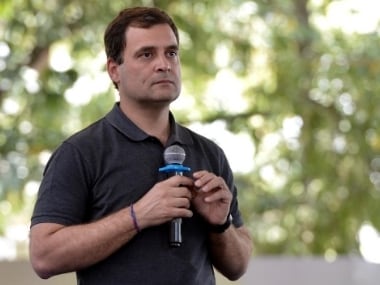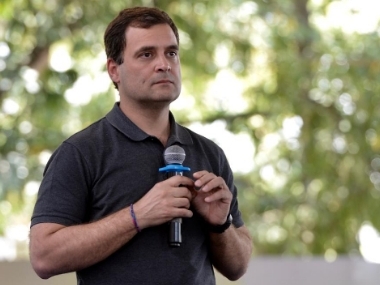The Congress Working Committee (CWC) meet in Gujarat, held after 58 years in the state, was billed to be a big bang event. For the first time, three members of party’s first family — Sonia Gandhi, Rahul Gandhi and Priyanka Gandhi Vadra — were to attend the meet. The choice of the venue was significant, at least in terms of symbolism, the last meet of party’s highest decision-making body held in Prime Minister Narendra Modi and BJP president Amit Shah’s home state. The presence of the Nehru-Gandhi family and entire Congress leadership — and also the fact that Priyanka ventured out of Amethi, Raebareli and Lucknow to campaign — had the potential to grab headlines and eyeballs. [caption id=“attachment_6252941” align=“alignleft” width=“380”]
 Congress president Rahul Gandhi interacts with the students at Stella Maris Women’s College, in Chennai. Twitter/@INCIndia[/caption] In August 2016, acting on the advice of the then Congress strategist Prashant Kishor, Sonia Gandhi sounded the bugle for the Uttar Pradesh Assembly polls with a high-voltage campaign by holding a roadshow in Varanasi, the parliamentary constituency of Modi. The campaign couldn’t get the desired publicity because Sonia took ill during the roadshow and had to abruptly return to Delhi. The rest was history: BJP won three-fourths of the seats and the Congress was reduced to only 7 seats in the 403-member state Assembly. In terms of strategy, while the CWC meet and a public rally in Gandhinagar follows same pattern as the Sonia roadshow in Varanasi, it would surely be too early to predict Congress’ prospects in the 2019 Lok Sabha polls. Though the Ahmedabad CWC meet and public rally went on as per schedule, it couldn’t get desired mileage despite Hardik Patel dropping his mask of political neutrality and joining the grand old party and sharing the dais with Rahul and Priyanka. Unfortunately for Congress, their high-profile meet CWC meet occurred in rather awkward circumstances: a day after Rahul made news for his “Masood Azhar ji” remark at party workers meet in New Delhi. And around the time top Congress leaders were landing in Ahmedabad, four party MLAs deserted Congress and joined BJP. And more setbacks awaited Congress during the day, with BSP chief Mayawati delivering it a decisive snub by announcing that the coalition led by her in Uttar Pradesh (BSP-SP-RLD) would have nothing to do Congress. The press release issued by her made it clear she didn’t think Congress would add any value to the alliance. In Maharashtra, senior Congress leader and Leader of Opposition Radha Krshna Vikhe Patil’s son Sujay Vikhe Patil joined BJP in presence of Chief Minister Devendra Fadnavis. Vikhe Patil family is one of biggest names in Maharashtra politics. In Bihar, RJD leader Shivanand Tiwari sounded a warning note to Congress: play a quiet second fiddle to Tejeshwi Yadav and that over-optimism and over-enthusiasm on part of state Congress leaders could lead to trouble. Priyanka’s start outside of the family strongholds of Raebareli and Amethi also began on a slightly awkward note and did not live up to the billing of senior Congress leaders and workers, who fondly refer to her as “Brahmastra”. The message emanating out of these developments in different parts of the country is clear: Congress is not looked upon as a party — neither by its own leaders nor its prospective allies — to be a potent force that could challenge the might of Modi and the BJP. Priyanka’s formal entry into politics and a change in the Congress hierarchical structure has not changed that. While the BJP has sealed its alliances and has put its seat-sharing arrangements with allies in major states such as Bihar, Maharashtra and Tamil Nadu in place, the Congress is struggling to come to terms for seat-sharing arrangement in almost all the states where it has an in-principle agreement for a coalition. In Uttar Pradesh, the Congress is being forced to go it alone, in Bihar seat-sharing negotiations have hit a road bock, in Karnataka, it is facing bumpy ride with JD(S), in Telangana and Andhra Pradesh Congress and TDP have parted ways, and in West Bengal the Trinamool Congress is not conceding any space for Congress despite the former being part of grand opposition. The list goes on. What is troubling Congress and other Opposition parties most is a perceptible change in public mood after Pulwama terror act and India’s air strike at Jaish-e-Mohammed facilities at Balakot, deep inside Pakistan territory. The biggest challenge that Congress now faces is to find an agenda that could set electoral narrative. They couldn’t find one at Tuesday’s CWC meet in Gujarat.
Congress president Rahul Gandhi interacts with the students at Stella Maris Women’s College, in Chennai. Twitter/@INCIndia[/caption] In August 2016, acting on the advice of the then Congress strategist Prashant Kishor, Sonia Gandhi sounded the bugle for the Uttar Pradesh Assembly polls with a high-voltage campaign by holding a roadshow in Varanasi, the parliamentary constituency of Modi. The campaign couldn’t get the desired publicity because Sonia took ill during the roadshow and had to abruptly return to Delhi. The rest was history: BJP won three-fourths of the seats and the Congress was reduced to only 7 seats in the 403-member state Assembly. In terms of strategy, while the CWC meet and a public rally in Gandhinagar follows same pattern as the Sonia roadshow in Varanasi, it would surely be too early to predict Congress’ prospects in the 2019 Lok Sabha polls. Though the Ahmedabad CWC meet and public rally went on as per schedule, it couldn’t get desired mileage despite Hardik Patel dropping his mask of political neutrality and joining the grand old party and sharing the dais with Rahul and Priyanka. Unfortunately for Congress, their high-profile meet CWC meet occurred in rather awkward circumstances: a day after Rahul made news for his “Masood Azhar ji” remark at party workers meet in New Delhi. And around the time top Congress leaders were landing in Ahmedabad, four party MLAs deserted Congress and joined BJP. And more setbacks awaited Congress during the day, with BSP chief Mayawati delivering it a decisive snub by announcing that the coalition led by her in Uttar Pradesh (BSP-SP-RLD) would have nothing to do Congress. The press release issued by her made it clear she didn’t think Congress would add any value to the alliance. In Maharashtra, senior Congress leader and Leader of Opposition Radha Krshna Vikhe Patil’s son Sujay Vikhe Patil joined BJP in presence of Chief Minister Devendra Fadnavis. Vikhe Patil family is one of biggest names in Maharashtra politics. In Bihar, RJD leader Shivanand Tiwari sounded a warning note to Congress: play a quiet second fiddle to Tejeshwi Yadav and that over-optimism and over-enthusiasm on part of state Congress leaders could lead to trouble. Priyanka’s start outside of the family strongholds of Raebareli and Amethi also began on a slightly awkward note and did not live up to the billing of senior Congress leaders and workers, who fondly refer to her as “Brahmastra”. The message emanating out of these developments in different parts of the country is clear: Congress is not looked upon as a party — neither by its own leaders nor its prospective allies — to be a potent force that could challenge the might of Modi and the BJP. Priyanka’s formal entry into politics and a change in the Congress hierarchical structure has not changed that. While the BJP has sealed its alliances and has put its seat-sharing arrangements with allies in major states such as Bihar, Maharashtra and Tamil Nadu in place, the Congress is struggling to come to terms for seat-sharing arrangement in almost all the states where it has an in-principle agreement for a coalition. In Uttar Pradesh, the Congress is being forced to go it alone, in Bihar seat-sharing negotiations have hit a road bock, in Karnataka, it is facing bumpy ride with JD(S), in Telangana and Andhra Pradesh Congress and TDP have parted ways, and in West Bengal the Trinamool Congress is not conceding any space for Congress despite the former being part of grand opposition. The list goes on. What is troubling Congress and other Opposition parties most is a perceptible change in public mood after Pulwama terror act and India’s air strike at Jaish-e-Mohammed facilities at Balakot, deep inside Pakistan territory. The biggest challenge that Congress now faces is to find an agenda that could set electoral narrative. They couldn’t find one at Tuesday’s CWC meet in Gujarat.
CWC meet on Narendra Modi's turf in Gujarat grabs headlines, but Congress fails to find narrative to challenge PM
Sanjay Singh
• March 14, 2019, 08:20:46 IST
Congress is not looked upon as a party — neither by its own leaders nor its prospective allies — to be a potent force that could challenge the might of Modi and the BJP.
Advertisement
)
End of Article